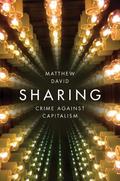Sharing
Crime Against Capitalism

1. Auflage Juni 2017
220 Seiten, Softcover
Wiley & Sons Ltd
Kurzbeschreibung
Today's economic system, premised on the sale of physical goods, does not fit the information age in which we live. The capitalist order requires the maintenance of an artificial scarcity in goods that have the potential for near infinite and almost free replication. The sharing of informational goods through distributed global networks - digital libraries, file-sharing, live-streaming, free software, free-access publishing, the free-sharing of scientific knowledge, and open-source pharmaceuticals - not only challenges the dominance of a scarcity-based economic system, but also enables a more efficient, innovative, just and free culture.
In a series of seven explorations of contemporary sharing, Matthew David shows that in each case sharing surpasses markets, private ownership and intellectual property rights in fostering motivation, creativity, innovation, production, distribution and reward. In transforming the idea of an information economy into an information society, sharing connects struggles against inequality and poverty in developed and developing countries. Challenging taken-for-granted justifications of the status quo, Sharing debunks the 'tragedy of the commons' and makes the case for digital network sharing as a viable mode of economic counterpower, prefiguring a post-capitalist society.
Today's economic system, premised on the sale of physical goods, does not fit the information age in which we live. The capitalist order requires the maintenance of an artificial scarcity in goods that have the potential for near infinite and almost free replication. The sharing of informational goods through distributed global networks - digital libraries, file-sharing, live-streaming, free software, free-access publishing, the free-sharing of scientific knowledge, and open-source pharmaceuticals - not only challenges the dominance of a scarcity-based economic system, but also enables a more efficient, innovative, just and free culture.
In a series of seven explorations of contemporary sharing, Matthew David shows that in each case sharing surpasses markets, private ownership and intellectual property rights in fostering motivation, creativity, innovation, production, distribution and reward. In transforming the idea of an information economy into an information society, sharing connects struggles against inequality and poverty in developed and developing countries. Challenging taken-for-granted justifications of the status quo, Sharing debunks the 'tragedy of the commons' and makes the case for digital network sharing as a viable mode of economic counterpower, prefiguring a post-capitalist society.
2. Libraries and the Digital World
3. Peer-to-Peer Music Sharing Online
4. Live-streaming and Television Rights Management
5. Open Source Software and Proprietary Software
6. Publishing: Academic, Journalistic and Trade
7. Genes, Genetically Modified Organisms, Patents and Agribusiness
8. Pharmaceutical Patents and Generic Drugs
9. Conclusions ? Sharing: Crime Against Capitalism
References
William H. Dutton, Quello Professor of Media and Information Policy, Michigan State University
"Matthew David has written a thought-provoking book that challenges the view that property rights are the only solution to the 'tragedy of the commons'. He brings a much needed analytical perspective to the study of the sharing economy and suggests that capitalist societies might just not be the end of history. A fascinating read."
Federico Varese, Professor of Criminology, University of Oxford


